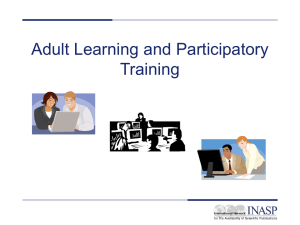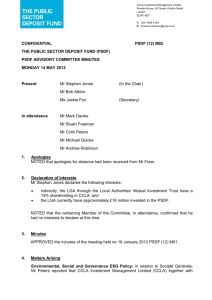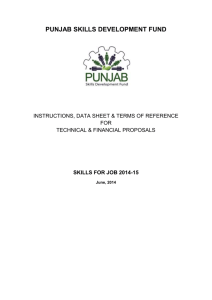Part B
advertisement
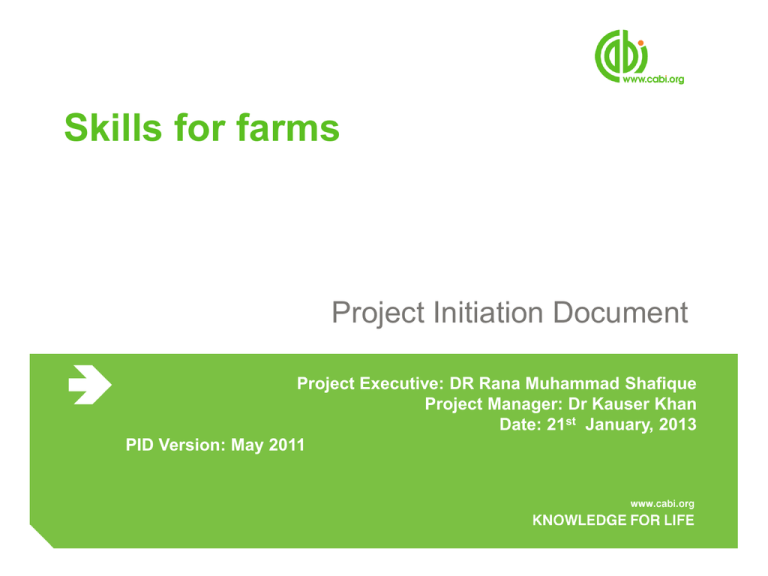
Skills for farms Project Initiation Document Project Executive: DR Rana Muhammad Shafique Project Manager: Dr Kauser Khan Date: 21st January, 2013 PID Version: May 2011 Part A – Background (1) Executive Summary & Objectives Executive Summary Punjab Skills Development Fund (PSDF) is funding training proposal for the poor and unskilled people of four Districts of South Punjab namely Bahawalpur, Bahawalnagar, Muzaffargarh and Lodhran to enhance their skills for better job, self employment and income generation opportunities. The trained people will contribute towards food security and the lives of the rural poor by utilization of skills obtained. PSDF has given liberty to the bidding organization to choose any number of districts out of four. Project Objectives Overall objective: To promote income generation opportunities and food security of the poor and the vulnerable farming community through skills for farms Specific objectives 1. Train 500 trainees from district Muzaffargarh of Punjab for Kitchen Gardening and Grain Storage Management trades Part A – Background (2) Key Stakeholders and Beneficiaries ● Stakeholders and Beneficiaries:● Donor(s): ● Punjab Skill Development Fund (PSDF) ● End-user(s): ● Agricultural Technicians, Professionals and Farmers ● Partner(s): ● Nil ● CABI Centres/Departments: ● CABI Central and West Asia Part B – Implementation (1) Proposed Organisation Structure ● Corporate Management: ● Project Board:● Project Executive: Rana Muhammad Shafique ● Senior Users: Aftab Ahmad (Technical Manager, PSDF) ● Senior Suppliers: Naeem Aslam ● Project Assurance: Muhammad Faheem ● CABI Budget-holder: Regional Director, CABI CWA Note that, if not the Project Executive, the CABI Budget-holder must have written confirmation from the Project Executive, and the Project Manager if required by Project Executive, prior to authorising payment. ● Project Manager: Dr. Kauser Khan ● Team Managers: Part B – Implementation (2) Stages Stages Work Packages / Deliverables in Stage, unless indicated in Stage Name Stage Completion Date WP1: Training of 1st Batch on Kitchen Gardening and on Grain Storage Management December 15, 2013 WP2: Training of 2nd t Batch on Kitchen Gardening and on Grain Storage Management March 15, 2014 WP3: Training of 3rd Batch on Kitchen Gardening and on Grain Storage Management July 15, 2014 WP4: Training of 4th Batch on Kitchen Gardening and on Grain Storage Management September 15, 2014 Course content/ training material and training manuals September 15, 2013 Part B – Implementation (3) CABI Resource Requirements Staff (and/or role on project) Time Required on Project (Indicate whether time is in Days or Months) Dr. Kauser Khan Project Manager 13 months Field Co-ordinator 65 days tba Community Mobilizer (1) 12.5 months tba Security Guard (2 full time and 5 part time) 54 months tba Office assistant / data operator (1) 12 months tba Trainers (5) 62.5 months tba Technical Assistant (5) 62.5 months Part B – Implementation (4) Customer Acceptance Criteria Acceptance Criteria Target Measures Training on Kitchen Gardening 250 trainees Attendance record Training on Grain Storage Management 250 trainees Attendance record Training Manuals 550 copies of manual on Distribution list both training Part B – Implementation (5) Project Exclusions & Interfaces Exclusions ● Activities limited to district Muzaffargarh of South Punjab Interfaces ● Close linkage with Punjab Government ● Interaction with certifying agencies, growers and extension workers ● Number of trained females will be favourable for other CABI ICM and IPM projects Preferable target group is youths (female) belong to farming community may adopt farming himself or get employment at some big farm Part B – Implementation (6) Key Constraints & Assumptions Constraints ● ● ● ● ● ● ● Project trainees are restricted only to be from mentioned district of south Punjab. Trainings need did assessed . It is understood that PSDF itself 1st did this assessment need and selected need based Trades for training. We are not supposed to do this Participation and interest of trainees in the training courses Drop out of trainees Penalty for non compliance. PSDF will release budget instalments subject to satisfactory M&E report of its audit party who will make surprise inspections of project on-going activities as well as checking of attendance of participants. PSDF will put penalty against drop of if any . We already did one project with PSDF and as such we have good experience to overcome the problem Socio-political interference Nil Assumptions ● ● ● Logistic arrangement for training venue will be done timely Development of course contents according to the local conditions Availability of proactive and innovative trainees in the project districts Part C – Reasons for CABI (1) Key Business Benefits - Strategic ● Excellent opportunity to build course content/ training ● ● ● ● material and training manuals Explore the new area of vocational training Opportunity to gain more business from Punjab Skill Development Fund in Punjab. Building expertise of CABI CWA staff in new business area Expecting more business through additional projects in the area Part C – Reasons for CABI (2) Key Business Benefits – Financial (1) DONOR-FUNDED PROJECTS Full Project Budget – Planned Donor Currency: Pak Rupees Exchange Rate to £: 150 Overall Contract Value in £ (if known): 0 Costs Billed to Project Donor (£) Gross Income: £261,840 Payments to External Collaborators: 0 Net Income: £261,840 CABI Implementation Costs (£) £47,767 £47,767 £161,705 £161,705 Net Profit/Loss (Project Contribution): £52,368 Net Project Contribution (%): 20.00% Note that the financials should match the information in the Project Financial Analysis (PFA) form. Comments Part D – Risks (1) Key Risks (for detail of Collaborator, Climate, Security, Technical Risks, see next slide) Risk Owner Likelihood (L) (1=Low; 3=High) Impact (I) (1=Low; 3=High) Total (L x I) (1=Low; 9=High) Management Strategy (Prevention, Reduction, Contingency, Transference, Acceptance - and give brief description of how applied) Failure to find trainees Project Manager 2 2 4 Reduction A social mobilizer will be appointed. Failure to find in time competent trainers Regional Director 1 2 2 Prevention Active replacement in case of signs of incompetence Low pass out ratio in compulsory certification Trainers 2 3 6 Prevention Effective monitoring If a Key Risk, include: (a) Collaborator (b) Climate Change (c) Security (d) Technical (NIL) (NIL) (NIL) (NIL) State Management Strategy - Give detail on next slide (NIL) Part D – Risks (2) Collaborator, Climate, Security, Technical Collaborator Name (to be paid by CABI) Has CABI worked with them before? (Yes / No) Assessment of Collaborator Risk Include, for example: • Their reputation; • Past experience of working with them (if appropriate). Percentage of Total Payment to Collaborators n/a Climate Change – Location of Work at Risk (identify those areas which may be affected by climate change and how the risk may be alleviated, e.g. alternative location etc): No climate change risk in the project area Security – Location of Work at Risk (list those locations of work where there is currently, or likely to be, a security risk, and indicate whether an alternative security location would be eligible for the project): No security risk in the project area Technical Risk (list the technical work and indicate whether this work has previously been undertaken by the Lead Centre, or another area of CABI): Any natural calamities and unfavourable weather conditions (Yes. The Lead Centre has been undertaken such work) Part E – Dissemination & Impact (1) Dissemination of Results Dissemination Method Target Results Measures Social media Creation of Facebook page Facebook page active; Progress reports Training manuals 550 manuals for Trainees and others Printed manuals distribution Print media Trainees selection Trainings advertisements Graduation ceremonies Wider appreciation by local government Invitation on occasions (what, how, etc.) Part E - Dissemination & Impact (2) Impact of Project (Scientific, Technical, Commercial, Social, Environmental) Impact Target Measures Enhanced capability and capacity of trainees about different skills for farms 500 trained persons in 2 trades Part F – Reporting and Sign-off (1) Reporting Information Provider Information Required Interested Parties Frequency a) Project manager b) c) a) Monthly Progress Reports b) c) Corporate Management (CABI) a) Monthly b) c) a) Project manager b) c) a) End project reports b) c) Project Board (CABI) a) Once at the end of project b) c) a) Project manager b) c) a) Success stories b) c) Marketing (CABI) a) Ad-hoc b) c) a) Project manager b) c) a) Monthly Progress Reports b) Training completion c) Donors / Funding Agency (External) PSDF a) Monthly b) Once at the end of project c) a) Project Manager b) a) Training inception Report b) PSDF a) Seven days before training initiation b) I think the project board rather than CABI corporate management will require monthly reports. Corporate will be interested in a mid-term and EOP report. You are right and this will be changed accordingly Part F – Reporting & Sign-off (2) Supporting Documentation ● Project Financial Analysis (PFA) ● Gantt Chart Please note that projects with an Intellectual Property Right (IPR) component require the contract to be submitted to PMG prior to signature. Part F – Reporting & Sign-off (3) Authorisation Project Executive: Dr Rana M. Shafique Date: 21st January, 2013 …………… Corporate Management Sign-off : ………………………………………….. …………………………………………………………………………………... Date: …………………………………………………………………………. Approval of: PID Development of Business Plan Comments and/or Follow-on Actions:
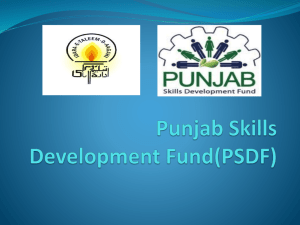

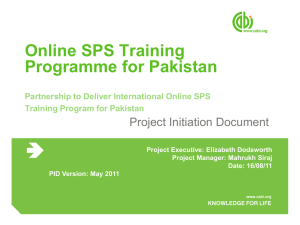
![Senior Supplier: [S Murphy]](http://s2.studylib.net/store/data/005470081_1-e104ea2fd5e2b6661eb586c19f7a89ca-300x300.png)


